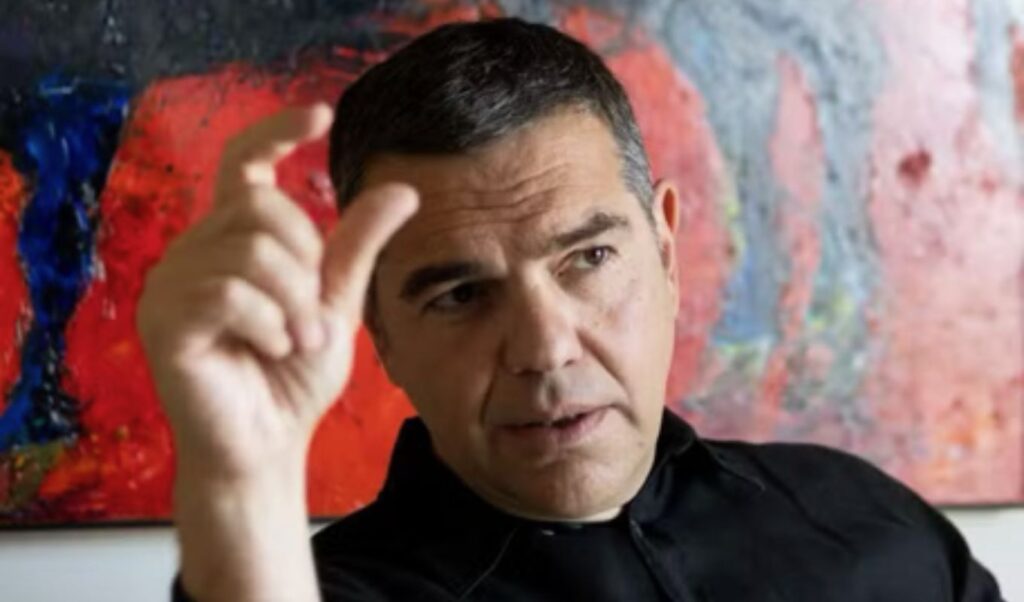Former Prime Minister Alexis Tsipras gave an extensive interview to French newspaper Le Monde, marking seven years since Greece’s exit from bailout programs, admitting that he misses active politics and contact with voters, while emphasizing that he never had a “thirst” for power. In his interview, the former prime minister analyzes the causes of the crisis, his government’s achievements and the country’s current economic situation.
According to Alexis Tsipras, Greece was led into economic crisis due to three critical factors: a dysfunctional production model, widespread corruption and clientelism. This crisis constituted a real Odyssey for the Greek people, with the exit from international economic programs in 2018 marking the beginning of a new era.
However, the former prime minister criticizes the government for not adequately exploiting the opportunities offered by the end of financial support. He characteristically states that the country has returned to a regime of generalized corruption, with the recent European agricultural subsidies scandal being an indicative example.
He presented data showing that between 2015 and 2019, incomes of the poorest increased by 45%, while conversely, between 2019 and 2023, incomes of the same group decreased by 8.1%. He argued that his government chose to burden the wealthy and reduced inequalities, while the current government, according to him, protects the “elites”.
Alexis Tsipras reveals details about 2015 negotiations
Alexis Tsipras announced his intention to reveal the truth about the dramatic period of 2015 and correct the myths that circulate. Despite being the main protagonist of the negotiations, he chose not to speak publicly about this period until now, unlike others who did not participate in the processes. For this reason, the former prime minister is working on a book to be published by the end of the year, in which he will present the complete picture of events.
Regarding the 2015 referendum, Alexis Tsipras explains that it was a strategic move to achieve a better outcome for the Greek people. Through this dramatization, he managed to secure concessions from creditors, resulting in Greece restructuring its public debt and exiting the international program in August 2018.
Key points from Alexis Tsipras’ interview with Le Monde
– Greece was led into crisis for three basic reasons: dysfunctional production model, generalized corruption and clientelism. This crisis was a modern Odyssey for the Greek people. Like Odysseus’ return to Ithaca after a long and difficult journey, the exit from international economic programs in 2018 marks Greece’s entry into a new era. However, the conservative government did not exploit the opportunities offered by the end of the country’s financial support.
-We have returned to generalized corruption. The European agricultural subsidies scandal that recently erupted is quite indicative.
-The time has come to reveal the truth and correct certain myths circulating about 2015. It’s true that, unlike many others who didn’t all participate in the negotiations, I didn’t speak about this dramatic period for Greece, even though I was the main protagonist. That’s why I’m writing a book, which will be published by the end of the year.
-Current growth benefits only a minority. According to recent surveys conducted at the beginning of the year, only one in five Greeks lives well, 45% of the population has financial difficulties and 35% is in debt.
-Let’s remember that in 2015 we managed to restructure debt and benefit from low interest rates until 2032. This will no longer apply after that and, for Greece to continue repaying its debt, it will need high growth rates. With the current production model, it will be difficult.
-Despite very strong pressure from creditors, my government chose to burden the wealthy with austerity and reduced inequalities. Under the conservative government of Kyriakos Mitsotakis, which has been in power since 2019, inequalities are increasing. Between 2015 and 2019, incomes of the poorest 10% increased by 45%, while they decreased by 2.7% for the richest 10%. Conversely, between 2019 and 2023, incomes of the poorest 10% decreased by 8.1%, while incomes of the richest 10% increased by 13%.
-The program I implemented between 2015 and 2019 led to fiscal cuts and taxes worth 8.1 billion euros, compared to 44 billion for the two previous ones. 84% of the austerity burden was imposed during the first two international economic programs.
– The neoliberal right of Mr. Mitsotakis or Mr. Bayrou wants to protect elites at any cost. This is one of the major differences with the Left, which, conversely, cares about the welfare of the many, the most vulnerable and the middle class.
– When I took over government leadership, the first two bailout programs had failed to correct the situation. The conservative government had left us with debt representing 180% of GDP, and empty coffers.
– With this referendum, I wanted to achieve a better outcome for the Greek people. It was a way, through a form of dramatization, to achieve concessions from creditors. And we partially succeeded, Greece was able to restructure its public debt, which allowed it to exit the international program in August 2018 and regain its economic autonomy.
-Thanks to what my political opponents call a “U-turn,” Greece is today a normal country that is no longer under international supervision and doesn’t let IMF officials dictate its policies. So I’m proud to have made this choice.
-I never thirsted for power. But I miss active politics and contact with voters.
Photo Source: LOUIZA VRADI – LE MONDE




